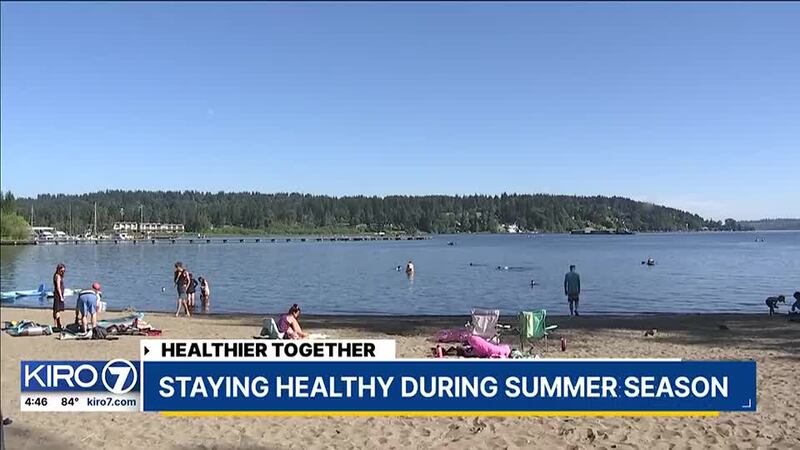Summer is in full swing, and so are some of the nuisances that come with it.
In Healthier Together, KIRO 7′s Ranji Sinha takes a look at health issues people often face in the summertime and how you can navigate them to stay healthy.
Summer sun does mean summer fun and spending time outdoors, but Summer can also have challenging situations:
- The sun can lead to sunburns.
- More time outside may lead to unwelcome insect bites.
- High heat can lead to dehydration.
Dr. Nicole Saint Clair, Executive Medical Director with Regence BlueShield, says sunburns can be inconvenient and lead to more significant health risks.
“Having had sunburns—especially multiple sunburns—increases a person’s lifelong risk of skin cancer,” Dr. Saint Clair said.
Sunburns can cause premature aging of the skin, skin cancer, and other issues.
On average, the risk for melanoma doubles if someone has more than five sunburns.
Seeking shade is the easiest solution, along with sunscreen, wearing a hat and sunglasses, and clothing that covers you up.
After a sunburn, you can apply aloe vera to the skin, take a cold bath, or take over-the-counter painkillers along with drinking water—but Dr. Saint Clair makes it clear the goal is to avoid sunburns.
“We’re trying to block ultra-rays—UVA and UVB—and we know they are most common at the peak of the day between 11 AM and 3 PM. (It) reduces wrinkles, age spots, and other things in general we don’t always love having,” Dr. Saint Clair said.
There is a lot of common ground between sunburn protection and protecting yourself from insect bites and dehydration.
“When you really find yourself with a lot of bites or really bothersome ones, and you’re trying to figure out what to do with it, it can be a little bit confusing,” Dr. Saint Clair said.
Over-the-counter remedies do work to treat bites. Applying Calamine lotion to a large area of bites can soothe the irritation.
But getting that one bite that’s big and not seeming to go away can lead to concerns.
Dr. Saint Clair highlights some of the bite situations that can prove to be more than a nuisance.
“Rarely, that can lead to a level of inflammation that you can start to feel inside your body. You can maybe start to have some fevers, fatigue, or nausea, if you’re experiencing anything like that, then it’s really time to make an appointment to see your doctor. (If) it feels like maybe it’s not healing as well as I would think it’s getting more red, the area around it might be getting red, and it might start to be painful. Those are signs it could be an infection,” Dr. Saint Clair said.
Dr. Saint Clair also says exerting yourself outside during the summer or even just staying out too long can lead to dehydration.
“Some of the signs of dehydration are feeling some fatigue, right away, most folks can kinda tell, ‘Hey, I’m feeling kinda tired. I’m feeling kinda crummy. I feel like I need to take a break,’” Dr. Saint Clair said.
Fixing dehydration has the simplest solution -- drink more water -- but Dr. Saint Clair says knowing the signs of severe dehydration is important.
“Sometimes, you can actually stop sweating where you had been sweating before. You also might find that you do not need to go to the bathroom very much even if you were taking in quite a bit of liquids earlier. If you start seeing folks developing any kind of confusion, mood changes, or irritability, those can be signs of very serious dehydration,” Dr. Saint Clair said.
Summertime should be more fun, and less focused on health concerns. Simple steps can keep the nuisances away and allow for a better summer experience.
©2024 Cox Media Group








